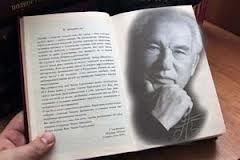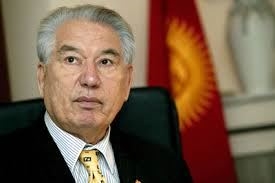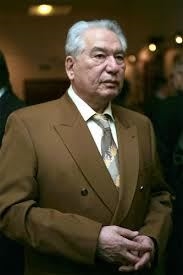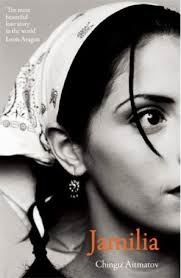 |
| Chingiz Aitmatov |
"Man does not die as long as the living who knew him"
 |
In 1946 he began studying at the animal Husbandry Division of the Kyrgyz Agricultural Institute in Frunze, but changed from the study of livestock to the study of literature at the Gorky Literature Institute in Moscow, where Aitmatov lived from 1956 to 1958. For the next eight years he worked for "Pravda". He made his literary debut in Russia, in 1952, with publication of his stories in Russian language "The newspaper boy Dziuio" and "Ashym". 'White rain" was his first work in Kyrgyz language, published in 1954. Aitmatov was honoured in 1963 with Lenin Prize for "Jamila" and later he was awarded a State Prize for "Farewell, Gulsary!". In 1967 he became a member of the Executive Board of the Soviet Writers Union. Chingiz Aitmatov won two more State Prizes in 1977 and 1983, and he was named a Hero of Socialist Labor in 1978.
 |
In 1961 he was a member of the jury at the 2nd Moscow International Film Festival. In 1971 he was a member of the jury at the 7th Moscow International Film Festival. From 1964 to 1985 he was Chairman of the Cinema Union of Kyrgyzian SSR, and in 1985 he was named Chairman of the Kyrgyz Writers Union. In 1990-1991 he served as an advisor to Mikhail Gorbachev and in 1990 was appointed Soviet Ambassador to Luxemburg. In 1995,he became Kyrgyzstan's ambassador to Belgium, Luxembourg and the Netherlands and also represented Kyrgyzstan in the European Union,NATO,UNESCO. Also during the 1990s Chingiz Aitmatov was member of the Kyrgyzstan's parliament.
 |
He wrote a lot of stories: "Jamila"(1958), "The first teacher"(1967), "Farewell,Gulsary!"(1967), "The white ship"(1972), "The day lasts more than a hundred years"(1988),"Face to face"(1957), "Tales of the Mountain and Steppes"(1963), "Spotted dog running on seashore"(1977), "Cranes fly early"(1979), "The seaffold"(1986), "Cassandra's brand"(1996), "When the mountains fall"(2006). His stories were translated into more than 165 languages across the world. French poet Lui Aragon said that: "Jamila" - is the most beautiful story about love in the world."
 |
| Chingiz Aitmatov |
Aitmatov's work has some elements that are unique specifically for his creative process. His work drew on folklore. He tried to recreate and synthesize oral tales in the context of contemporary life.In nearly every story he refers to a myth, folktale or legend.
Page created on 2/28/2015 12:00:00 AM
Last edited 2/28/2015 12:00:00 AM
